Earning a Living vs. Getting a Gig: What Composers Need to Know
What you don’t know can change the game for you and your future.
Whether you write a composition for streaming services, television, film, or video games, there are so many opportunities to make money beyond the original composing or package fee. These backend royalties are generated over many decades, wherever and whenever your music is used. This includes airings on broadcast, cable, streaming platforms, traditional and satellite radio plays, and streaming service performances. You can also receive royalties from consumer products, including interactive dolls and toys, electronic and physical greeting cards, holograms, Broadway shows and soundtrack album sales, advertising commercials – even online musical instrument lessons.
But you might ask, how do I get paid royalties?
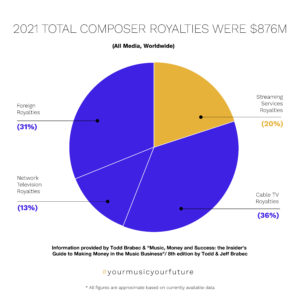
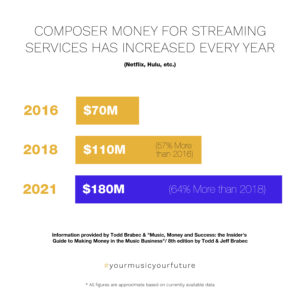
For nearly 100 years, composer and songwriter contracts have always included an initial composing or package fee and work-for-hire language that states that someone else owns your work in exchange for– most importantly– a guarantee of continuing “backend royalties” for the use of the music you’ve written. These are called public performance royalties. It’s this guarantee that represents the primary way composers are able to earn a living.
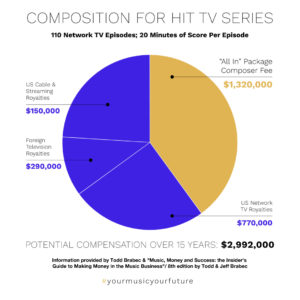
Though agents, lawyers, and other professionals are normally the ones negotiating contracts in this field, some people just starting out don’t have those resources. This is why it’s vital for composers to have an understanding of the basics — what a deal means, what the standards are for composer deals, and the financial implications of your signature.
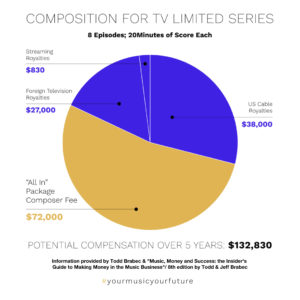
To give you an idea of what’s at stake, here are a few quotes from the 8th edition of “Music, Money and Success: the Insider’s Guide to Making Money in the Music Business”:
- “The largest source of continuing royalty income for most score composers are the performance payments received from ASCAP. BMI, SESAC and GMR.”
- “3 seasons of a successful drama can earn from the composer of the score in excess of $500,000. in network, cable, streaming service and foreign country earnings.”
- “Motion picture composers can and have earned in excess of $500,000 in television and foreign country theatrical royalties for a single successful film over its full term of copyright.”
- “The top foreign countries for composer royalties are the UK, France, Germany, Canada, Japan, Italy, Australia and the Netherlands, among others. 70% of all foreign royalties come from the EU.”
- Total writer and publisher income from all sources for a successful movie or television song: $2,185,200.”
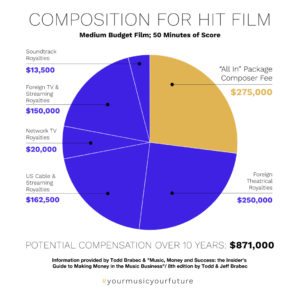
The Hazards of the Complete Buyout
What if there were no backend royalties for your work? What if a composer or songwriter took a complete buyout — a one-time fee with no future compensation? What do you give up when you sign this type of deal?
- Performance royalties every time the project is aired anywhere in the world. ASCAP, BMI, SESAC and GMR royalties for network, local and cable television as well as audio visual streaming services in the U.S. and throughout the world.
- Theatrical motion picture royalties outside the U.S. Approximately 1% of the box office shared by all writers and publishers credited on a cue sheet.
- A percentage of the weekly box office or a royalty pool monthly payment if your composition is used in a Broadway musical.
- Traditional radio, satellite and audio streaming service royalties.
- Synchronization fees when your composition is used in advertising commercials, theme parks, trailers, promos, apps, video games, greeting cards- both physical and e-cards, holograms, interactive dolls and toys, airlines, music boxes, online musical instrument lessons, karaoke, samplers, mashups, digital jukeboxes, etc.
In short, you lose every source of income and continuing royalties, upon which composers and songwriters have relied for over 100 years. These backend royalties range from thousands of dollars to millions of dollars for a single composition or score. That’s what you are potentially giving up.
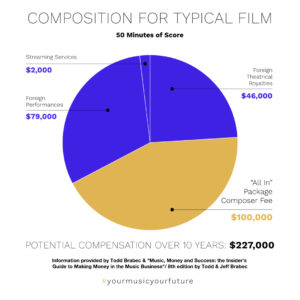
A complete buyout may get you the gig, but it also sets a precedent for what deal you are expected to take in the future. Gig now or career forever? It is 100% your choice.
You aren’t alone – there are resources available to make sure you stay smart and there’s an entire community that’s been in your shoes.
FAQs:
Q: What’s a fair or standard deal?
A: The standard composer deal is that you agree to sell the copyright to your music to the studio or production company in exchange for the ability to collect 100% of the writer’s share of performance royalties (backend royalties), which you can collect through ASCAP, BMI, SESAC or GMR. These organizations can point you in the right direction.
Q: What if I am only offered a complete buyout?
A: Most of the time, if you let the studio or production company know that you understand what the standard deal is, and that you insist on these terms, they will give it to you. If you don’t ask, you won’t get it – be your strongest advocate.
Q: What if they offer me a lot more money (double or triple) in the composer package fee to accept the complete buyout?
A: It happens a lot. You could get a little more money upfront, but you give up the chance to make hundreds of thousands or even millions of dollars if your work and the show, film, or project are successful. It is 100% your choice. But it’s important to remember that if you take the buyout now, it may be expected for the next project now that you’ve set precedent.
Q: What if they say no? Where can I go for help?
A: Sometimes the producer or the showrunner of a film, show or other project can help you if you ask for it. Let them know that you’re not being offered a standard deal. Very often, they are willing to speak up to help. They want the best music for their project.
Q: I need help with the contract. Where can I go for legal advice?
A: Here are several links to affordable resources that you could use –
- Volunteer Lawyers for the Arts – NY
- Indie Artist Resource
- Lawyers for the Creative Arts
- California Lawyers for the Arts
Q: Is there somewhere I can go for all types of articles relating to contracts, how-to’s, and the industry as a whole?
A: musicandmoney.com is a great place to start for all of this.
Q: What does a typical contract look like?
A: Here is a website that includes a variety of typical contracts that composers and music creators might come across throughout their career.